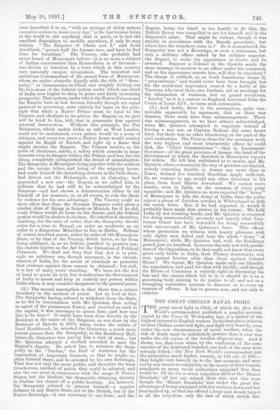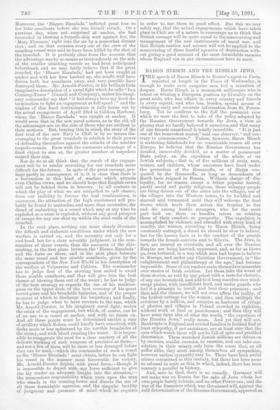THE GREAT CHILIAN NAVAL FIGHT.
T"great naval fight in Chili, of which the New York World's correspondent published a graphic account, copied by the Times of Wednesday last, is a matter of the highest interest to English readers. In the first place, it shows us that Chilian crews will fight, and fight very bravely, even under the now circumstances of naval warfare, when the risk of death must be indefinitely greater than it ever was under the old regime of the wooden ships-of-war. And it shows, too, that even when, by the confession of the com- mander of the destroyed ironclad, one-half of the crew were actually killed,—the New York World's correspondent put the proportion much higher, namely, at 188 out of 200,.— they fought very bravely up to the last moment, and were not by any means so completely at the mercy of their torpedo assailants as many naval authorities supposed that they would be. Of the six or seven torpedoes fired at the' Blanco Encalada,' all but one missed their aim, and this even though the 'Blanco Encalada was under the great dis- advantage of being surprised with her anchors down and her fires banked up, so that she offered. a huge and steady target to all the torpedoes, only the last of which struck her. Moreover, the Blanco Encalacla ' inflicted great loss on her little assailants before she was herself struck. On a previous day, when not surprised at anchor, she had succeeded in blowing a torpedo-ship sent against her, the Mary Florence,' right into the air by a somewhat distant shot ; and. on that occasion every one of the crew of the assailing vessel were said to have been killed by the shot of the ironclad. It is perfectly clear from the account that the advantage was by no means so tremendously on the side of the smaller attacking vessels as had been anticipated beforehand, and we may fairly believe that if the great ironclad, the 'Blanco Encalada,' had not been caught at anchor and with her fires banked up, she might well have driven both her assailants away, and very possibly have destroyed them. Mr. Arnold-Forster, in his brilliant little imaginative description of a naval fight which he calls "In a Conning-Tower" (Cassell and Company), makes his imagi- nary commander say that "it had always been my fixed de- termination to fight an engagement at full speed ; ' and the wisdom of this fixed determination is fully borne out by the actual engagement of April 23rd in Caldera, Harbour, where the 'Blanco Eucalada ' was caught at anchor. It would seem that in the new naval actions, as in the old, all the .advantages are on the side of those who are swiftest in their motions. But, bearing this in mind, the story of the first trial of the new Navy in Chili is by no means dis- couraging to the great ironclacls in relation to their power of defending themselves against the attacks of the nimbler torpedo-vessels. Even with the enormous advantage of a fixed object to aim at, the greater number of torpedoes missed their aim.
Nor do we at all think that the result of the engage- ment will be to render recruiting for our ironclads more difficult for the future. In spite of the great carnage, per- haps partly in consequence of it, it is clear that there is a fascination in this kind of warfare which attracts even Chili= crews, and we should hope that English crews will not be behind. them in bravery. In all contests in which the play of what we are compelled to call chance, from our inability to foresee the real combinations, is enormous, the attraction of the high excitement will pro- bably be found to neutralise, and more than neutralise, the dread of embarking in a vessel which may at any time be exploded as a mine is exploded, without any good prospect of escape for any one shut up within the steel walls of the ironclad.
In the next place, nothing can more clearly illustrate the difficult and elaborate conditions under which the new warfare is carried on, and the necessity not only for a cool head, but for a clear scientific judgment, in the com- manders of these vessels, than the accounts of the skir- mishing, in the first place between the Blanco Encalada. ' and the forts on shore, and. in the next place; 'between the same vessel and her nimble assailants, given by the correspondent of the New York World in his description of the warfare at Valparaiso and Caldera. The commander has to judge first of the steering best suited to avoid those nimble assailants, and that will give him the best chance of blowing them out of the water ; he has to judge of the best strategy as regards the use of his machine- guns on the upper deck, of the best economy of his great turret-guns and his broadside batteries, and of the proper moment at which to discharge his torpedoes ; and finally, he has to judge when to have recourse to the ram, which Mr. Arnold-Forster, in his imaginary naval fight, makes the crisis of the engagement, but which, of course, can be of no use to a vessel at anchor, and with no steam on. And all these points must be determined amidst a roar IA artillery which Nelson could hardly have conceived, with decks more or less splintered by the terrible broadsides of the enemy, and with blood running like water. It is impos- sible to exaggerate the need for a clear mastery of all the delicate working of such weapons of precision as these,— and not a few of them will be more or less deranged before they can be used,—which the commander of such a vessel as the 'Blanco Encalada ' must obtain, before be can fight his vessel in the manner most favourable for victory. Mr. Arnold-Forster depicts with great forco,—though it is impossible to depict with any force sufficient to give the lay reader an adequate insight into the situation,— the tremendous responsibility which rests upon the man who stands in the conning-tower and directs the use of all these formidable agencies, and the singular lucidity of judgment and presence of mind which he requires in order to use them to good effect. But this we may safely say, that the actual engagements which have taken place in Chili are of a nature to encourage us to think that British courage will be quite equal to the manceuvring and management of the new instruments, of naval war, and that British caution and science will not be applied to the manoeuvring of these fearful agencies of destruction with- out giving a good account of the most formidable enemies whom England can in any circumstances have to meet.







































 Previous page
Previous page